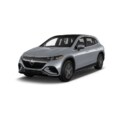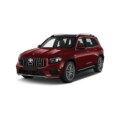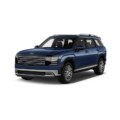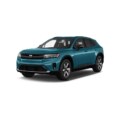- Home
- Mercedes Benz
- Mercedes-Benz G-Class Electric
Mercedes-Benz G-Class Electric















Full Specifications
Overview
| Models Car models are the different versions or designs of cars made by a manufacturer, each with unique features, styles, and configurations. | G-Class Electric |
| Year typically refers to the model year of a vehicle, which indicates its design and production cycle rather than the actual manufacturing date. | 2025 |
| All Electric Range The distance an electric vehicle can travel on a single battery charge without using any gasoline or other fuels. | 239 mi. |
| Drive Type A car's drive type refers to which wheels receive power from the engine. For example, front-wheel drive (FWD) powers the front wheels, rear-wheel drive (RWD) powers the rear, and all-wheel drive (AWD) or four-wheel drive (4WD) power all four wheels. | four wheel drive |
| Total Seating Car total seating refers to the maximum number of passengers a car can accommodate, including the driver. | 5 |
| Cargo Capacity Car cargo capacity is the measurement of the space available in a vehicle for storing items, typically given in cubic feet or liters. | 37.3 cu.ft. |
| Home Charging Time (240V) | 14.0 hr. |
| Dealerships Car dealerships are businesses that sell new or used vehicles directly to consumers, often providing financing, trade-ins, and maintenance services. |
2411 S Federal Hwy, Fort Lauderdale, FL 33316, United States |
Fuel & MPG / Battery & Range
| Fuel type Fuel type refers to the kind of energy source used to power an engine or appliance, such as gasoline, diesel, electricity, or alternative fuels. | Electric |
| Battery capacity Car battery capacity is the amount of electrical energy a battery can store and deliver, usually measured in ampere-hours (Ah). | 122.0 kWh |
| EPA combined MPGe The EPA combined MPGe rating shows how many miles a car can travel using energy equivalent to one gallon of gasoline, blending city and highway efficiency. | 62 MPGe |
| EPA city/highway MPGe EPA city/highway MPGe measures a vehicle's energy efficiency in city and highway driving, expressed in miles per gallon equivalent (MPGe), comparing electric energy use to gasoline consumption. | 68/56 MPGe |
| Range in miles (city/hwy) Car range refers to the distance a vehicle can travel on a full tank of fuel (or a full battery charge) and is usually measured separately for city driving—which often gives a lower range due to stop-and-go traffic—and highway driving, where steady speeds generally result in a higher range. | 239 mi. |
| EPA kWh/100 mi EPA kWh/100 mi is a measure of an electric car's efficiency, showing how many kilowatt-hours of energy the vehicle consumes to travel 100 miles. | 54 |
| Fast-charge port type A car fast-charge port is a high-power charging connector designed to quickly deliver direct current (DC) to an electric vehicle’s battery, reducing charging time compared to standard charging ports. | SAE Combo |
| EPA time to charge battery (at 240V) Most electric cars typically require about 8–12 hours for a full charge on a 240V (Level 2) charger, though the exact time depends on the car's battery capacity and efficiency. | 14.0 hr. |
Engine
| Base engine size The car’s base engine size usually refers to its engine displacement, which is the total volume of all the cylinders (measured in liters or cubic centimeters). | Electric |
| Horsepower Car horsepower is a unit of power that measures how much work an engine can perform, with one horsepower roughly equal to 746 watts. | 579 hp |
| Torque Car torque is a measure of the engine's twisting force, indicating its ability to accelerate the vehicle and overcome resistance. | 859 lb-ft |
Towing & Hauling
| Max Payload Capacity | 915 lbs. |
Drivetrain
| Transmission A car transmission is the system that transfers power from the engine to the wheels, using different gear ratios to control speed and torque. | 1-speed direct drive |
| Drive Type A car's drive type refers to which wheels receive power from the engine. For example, front-wheel drive (FWD) powers the front wheels, rear-wheel drive (RWD) powers the rear, and all-wheel drive (AWD) or four-wheel drive (4WD) power all four wheels. | Four wheel drive |
| Descent control | Standard |
Suspension
| Four-wheel independent suspension | Standard |
| Front and rear stabilizer bar | Standard |
Dimensions
| Length | 182.0 in. |
| Overall width with mirrors | 86.1 in. |
| Overall width without mirrors | 76.0 in. |
| Height | 78.2 in. |
| Wheelbase A car's wheelbase is the distance between the centers of its front and rear wheels. | 113.8 in. |
| Cargo capacity, all seats in place | 37.3 cu.ft. |
| Maximum payload | 915 lbs. |
| Manufacturer 0-60 mph acceleration time | 4.6 seconds |
| Turning circle The car turning circle is the smallest circular path a vehicle can complete, reflecting its maneuverability. | 44.6 ft. |
| Ground clearance he distance from the lowest part of the car to the ground. This measurement is important because it determines how well a car can handle rough or uneven terrain. | 9.8 in. |
| Gross weight Car gross weight is the total weight of the vehicle including passengers, cargo, fuel, and all additional equipment. | 7,716 lbs. |
| Country of final assembly A car’s country of final assembly is the nation where the vehicle is put together into its final form, regardless of where its parts were produced. | Austria |
Front Seat Dimensions
| Front head room | 41.9 in. |
| Front leg room | 38.7 in. |
| Front shoulder room | 57.8 in. |
| Bucket front seats | Standard |
| Height adjustable passenger seat | Standard |
| Passenger seat with power adjustable lumbar support | Standard |
| Multi-level heated driver seat | Standard |
Rear Seat Dimensions
| Rear head room | 40.5 in. |
| Rear leg room | 39.5 in. |
| Rear shoulder room | 57.4 in. |
| Split-folding rear seatback | Standard |
| Folding with pass-thru center armrest | Standard |
In-Car Entertainment
| Display size | 12.3" |
| Total speakers | 18 |
| AM/FM stereo | Standard |
| Surround audio surround audio (discrete) | Standard |
| Android Auto/Apple CarPlay | Standard |
| USB connection | Standard |
| USB with external media control | Standard |
Power Feature
| 4 one-touch power windows | Standard |
| 1st row power glass moonroof | Standard |
| Hands-free entry | Standard |
| Heated mirrors | Standard |
Instrumentation
| Trip computer | Standard |
| Compass | Standard |
| Tachometer | Standard |
| External temperature display | Standard |
| Clock | Standard |
Tires & Wheels
| Painted alloy wheels | Standard |
| Tires Size | 275/50R20 |
| Wheels Size | 20 x 8.5 |
| Temporary spare tire | Standard |
Telematics
| Emergency Service | Standard |
| Airbag Deployment Notification | Standard |
| Vehicle Alarm notification | Standard |
| Stolen Vehicle Tracking/Assistance | Standard |
| Roadside Assistance | Standard |
Warranty
| EV Battery | N/A |
PROS
- Powerful Performance: With 579 horsepower and 859 lb-ft of torque, it delivers exhilarating acceleration (0–60 mph in 4.6 seconds).
CONS
- Limited Range Compared to Rivals: 239-mile range may fall short for long-distance travelers.
The 2025 Mercedes-Benz G-Class Electric G 580 w/EQ Technology redefines rugged luxury with 579 hp, 859 lb-ft of torque, and 239 miles of all-electric range. Built in Austria with iconic G-Wagon styling, it features fast charging, four-wheel drive, and a spacious 37.3 cu.ft. cargo hold—ideal for both off-road adventure and upscale urban driving.
Your question is: Mercedes-Benz G-Class Electric G 580 w/EQ Technology?
Which question will you have about this car? Let’s justify these. There, we are including the major questions and answers about this car. So, let’s start now.
What is the electric range of the 2025 G-Class Electric?
The 2025 Mercedes-Benz G-Class Electric offers an estimated all-electric range of 239 miles on a full charge.
How long does it take to charge the G-Class Electric at home?
Charging at home using a 240V outlet takes approximately 14 hours to fully charge the battery.
How fast is the 2025 G-Class Electric?
It accelerates from 0 to 60 mph in just 4.6 seconds and has a top speed of 180 km/h (112 mph).
What is the towing or payload capacity of the electric G-Wagon?
The maximum payload capacity of the 2025 G-Class Electric is 915 lbs.


















